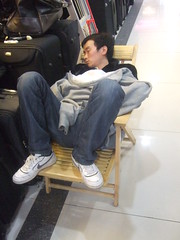Search
Articles Posted in Age
It’s tough to prove age bias after getting caught sleeping on the job
 I was reading this Third Circuit decision yesterday about an employee who got demoted for sleeping on the job, and all I could think of was Homer Simpson. For not unlike Homer J., a nuclear safety technician, this employee was responsible for monitoring his plant’s equipment to prevent malfunctions that could result in explosions, property damage, injuries, and fatalities. Except, unlike Homer, the former employee was allegedly found sleeping on the floor of his office, with a pillow, blankets, and an alarm clock nearby. Now that’s what I call an all-out Costanza! All that’s missing here are the empty calories and male curiosity, eh Georgie?
I was reading this Third Circuit decision yesterday about an employee who got demoted for sleeping on the job, and all I could think of was Homer Simpson. For not unlike Homer J., a nuclear safety technician, this employee was responsible for monitoring his plant’s equipment to prevent malfunctions that could result in explosions, property damage, injuries, and fatalities. Except, unlike Homer, the former employee was allegedly found sleeping on the floor of his office, with a pillow, blankets, and an alarm clock nearby. Now that’s what I call an all-out Costanza! All that’s missing here are the empty calories and male curiosity, eh Georgie?
Instead, we are left with a baseless age-discrimination lawsuit from a employee, claiming that when he was demoted, it wasn’t for sleeping on the job. Rather, it was because of his age and an unwritten policy “to get rid of older employees,” premised upon a single stray remark and slipshod investigation into the sleeping incident.
Smell that? Yeah, me too… (And it’s not what The Rock is cookin’)
To prove age discrimination, an employee must demonstrate, at a minimum, that the employment action taken occurred under circumstances that give rise to an inference of discrimination. One stray remark and a poor investigation — even if true — do not indicate that age was the motivating reason behind an employment decision, which is the burden that a plaintiff must meet to prove age discrimination.
What’s the lesson to be learned here? If you are going to sleep at work, don’t get caught, of course. Or maybe do your sleeping at home…in a bed.
Now hear this: Hearing loss comments are evidence of age bias
 It is unlawful under the Age Discrimination in Employment Act “to discharge any individual or otherwise discriminate against any individual with respect to his compensation, terms, conditions, or privileges of employment, because of such individual’s age.” An employee who alleges that she was fired in violation of the ADEA has a tough time prevailing because she must demonstrate not that “age was a reason” behind the termination decision, but rather that “age was the reason.”
It is unlawful under the Age Discrimination in Employment Act “to discharge any individual or otherwise discriminate against any individual with respect to his compensation, terms, conditions, or privileges of employment, because of such individual’s age.” An employee who alleges that she was fired in violation of the ADEA has a tough time prevailing because she must demonstrate not that “age was a reason” behind the termination decision, but rather that “age was the reason.”
In a recent decision, a Mississippi federal court allowed a plaintiff, a former beauty supply company employee who suffered from hearing loss, to take her age discrimination claims to trial because she had presented evidence that that her manager made remarks such as, “Yeah, that’s what happens when you get old.”
[I was going to break in here in Alright Hear This, but two f-bomb’s and a sh*t preclude that. Instead, we’ll try this one.]
Meyer(s) on Pending Employment Bills, Social Media, and Slides
On Employment Legislation:
Just when you thought you had the employment law landscape figured out, along comes pending legislation that could change everything. From age discrimination claims to workplace flexibility to unionization and labor organizing, new bills in the House and Senate may change the way you run your business. Here I am discussing all that jazz with Stephanie Thomas at the Proactive Employer.
On Social Media:
EEOC clarifies ADEA “reasonable factors other than age” defense
 Yesterday, the U.S. Equal Employment Opportunity Commission (EEOC) issued its “Final Regulation on Disparate Impact and Reasonable Factors Other than Age” (RFOA) under the Age Discrimination in Employment Act of 1967 (ADEA).
Yesterday, the U.S. Equal Employment Opportunity Commission (EEOC) issued its “Final Regulation on Disparate Impact and Reasonable Factors Other than Age” (RFOA) under the Age Discrimination in Employment Act of 1967 (ADEA).
Wait, wha, wha, what the heck is an RFOA? (The Cliff Notes versions because, like, you could click on the link above, dudes.)
Can you tell it’s been a long day as I punch out this post? Anyhoo, make with the jump, dawg…
* * *
4 new employment-law bills now pending in Congress
Below are summaries of four pieces of legislation of which employers should take note:
- Protecting Older Workers Against Discrimination Act. Senator Tom Harkin (IA-D) introduced this bill last week. It would overturn the U.S. Supreme Court’s decision in Gross v. FBL Financial Services, Inc. and lower the burden of proof for employees to prove age discrimination claims.
- National Right to Work Act. Senator Jim DeMint (SC-R) has introduced this bill to “preserve and protect the free choice of individual employees to form, join, or assist labor organizations, or to refrain from such activities.”
And the most ridiculous lawsuit of 2011 was…
According to FacesOfLawsuitAbuse.org, the lawsuit that keeps those lawyer jokes flowing is…
Convict sues couple he kidnapped for not helping him evade police. A man who kidnapped a couple at knifepoint while he was running from the police is now suing the victims, claiming that they promised to hide him in exchange for an unspecified amount of money. The plaintiff, currently in jail, is seeking $235,000 for the alleged “breach of contract.”
And from the ridiculous to the sublime just-about-as ridiculous…
Age discrimination: It’s not rocket science.
Oh, Meyer, where are you going with this one?
Well, it’s my chance to play a little GnR after the jump while reminding my awesome employer readers about what it takes for an employee to actually prove a claim of age discrimination.
(Hint: It’s not easy)…
* * *
What are the consequences of ignoring a written handbook policy?
What’s the point of having a written handbook policy if you aren’t going to follow it? Better yet, what are the consequences of not following that handbook policy?
(Hint: they’re bad).
Find out why after the jump…
* * *
Will ya just retire already? No, but I’ll sue for age discrimination.
Back in August, I blogged about a case where a federal court held that an employer inquiring about an employee’s retirement plans, alone, does not discriminate on the basis of age. But what about relentlessly browbeating a plaintiff into retiring? Could that be age discrimination? What do you think, Brett? Find out after the jump…
* * *
 The Employer Handbook Blog
The Employer Handbook Blog




